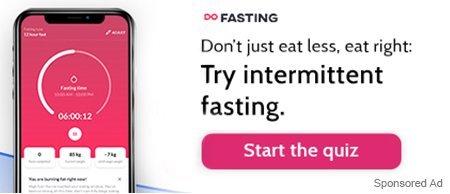What Is Intermittent Fasting | Rules of Intermittent Fasting | Does Intermittent Fasting Work | Adapting To An Intermittent Fasting Diet
Fasting has been performed for thousands of years and is a significant tradition in many faiths and civilizations worldwide. Modern forms of fasting, like intermittent fasting, are done by twisting the rules of this age-old practice. What are the intermittent fasting rules, let’s dig deeper.
Intermittent fasting is a trending method, with many health experts advocating its numerous benefits. Proponents argue it is viable for long-term weight loss and health improvement. According to one study, eleven out of thirteen studies on intermittent fasting found that participants lost weight with it.
What Is Intermittent Fasting?
With intermittent fasting, you consume all your calories within a specific eating window each day, depending on the IF plan you follow, and fast for the rest of the time. You refrain from meals when fasting; however, you’re still permitted to drink water and other no-calorie beverages, such as black coffee or tea, during this window. Depending on your inclination, you may repeat this cycle as often as you’d like—from once or twice each week to every day.
Typical intermittent fasting plans include 16:8 fasting, 14:10 fasting, 5:2 fasting, One Meal a Day (OMAD), Eat Stop Eat, Alternate-Day, and so on.
Intermittent fasting has gained immense popularity among people trying to reduce their body fat percentage. It regulates blood sugar, is suitable for cardiovascular health and cognitive functions, enables autophagy, defends against the coronavirus, and increases lifespan, among many other benefits.
Those who have passed menopause may react differently to intermittent fasting. Changes associated with menopause might reduce insulin sensitivity and contribute to weight gain; intermittent fasting may help ameliorate these effects.
Intermittent fasting may significantly impact your lifestyle with minimum interruption to your diet, in contrast to other diets that prescribe tight limits. It may be adapted to a wide variety of lifestyles since it is less stringent and more versatile than most other diets.
What are the Intermittent Fasting Rules?
Intermittent fasting, when practiced properly, is beneficial in several ways. However, if done poorly, it might offer no results. Added to that, it may bring on the hunger blues and make you feel constantly hungry and exhausted.
If this has happened to you, it’s understandable that you would feel discouraged and abandon your fasting plan completely. If you follow a few guidelines while intermittent fasting, you should be able to reach your objectives and work around your obstacles. Some rules for intermittent fasting are listed below to help you succeed with this diet.

1. Abstain From Food Throughout The Fasting Period
This rule is the foundation of intermittent fasting, which seems straightforward yet is difficult for most people to adhere to. Your hectic daily routine could push you into taking calories during your fasting window without even noticing it.
Don’t sweeten your morning beverages, like coffee or tea, by adding sugar or milk. Even a few calories will mess up your fasting day or window if you consume them outside your eating window. Think over your daily routine and ensure you don’t accidentally ingest any calories outside your meal time.
2. Follow A Regular Eating Schedule
It is an essential rule since you should establish a pattern that works best for your body while intermittently fasting. That allows your body to get used to fasting longer between meals and alter the times you eat to coincide with your body’s metabolism and the circadian clock.
Most of our physical functions vary during the day, and, to a degree, we can control how they fluctuate. For example, if you often forego breakfast, your body may learn to function in response to the absence of food in the morning. You will also cease feeling hungry at that time. It implies that your body will not adapt to fasting if you are not regular with your eating window. So before starting it, learn how many hours of intermittent fasting work best for you.
3. Make Sure You Are Consuming Enough Food
You should avoid going on a very low-calorie diet to lose weight quickly with intermittent fasting. It is supposed to be a long-term habit that helps you reclaim control of your health and sustain it. Long-term calorie deficits may make people feel tired, irritable, and angry. Worse, you may reach a weight loss plateau and abandon your efforts.
You can be in a calorie deficit when you first attempt fasting, and that’s okay since your body is adapting. But after 2-3 weeks, you should try to eat enough calories to feed your body effectively.
Several calorie-calculating websites will give you an estimate based on your sex, height, weight, age, and activity level to help you calculate how many calories you need to consume every day. You can use a calorie-monitoring app to assist you in figuring out how many calories you consume.
4. Eat Healthy, Wholesome Food
The sort of food you consume matters. While it’s true that you don’t have to worry as much about your calorie intake during your eating window, this shouldn’t be an excuse to eat junk food. If you want to be in the best possible health, a diet rich in fruits, vegetables, whole grains, lean meats, and healthy fats is a great place to start.
5. Keep Drinking Water
Keeping hydrated is crucial during intermittent fasting. It is because your body will use its glycogen (stored sugar) for energy throughout your fast. It causes increased water loss and dehydration. To forestall the unpleasant effects of dehydration, you must improve your water intake.
When you initially begin fasting, your body will utilize more glycogen reserves for energy than usual as it adapts to the lack of food. Make sure you pay attention to the color of your pee. You should drink extra water if it is a vivid or deep yellow.
You should drink plain water to stay hydrated. Black coffee, green tea, or other herbal teas without milk, honey, or sugar are fantastic alternatives. While you’re getting used to fasting, drinking extra water may help you feel full for longer.
6. Don’t Stop Enjoying Your Life
Do not give intermittent fasting too much power over your life. If you’re trying intermittent fasting to improve your health, it shouldn’t be so difficult that it negatively affects your mental health, makes you miss out on important social events, or makes you feel guilty about eating.
Instead, this eating plan should make you feel healthier, more confident, and happier. If you attempt alternate-day fasting and a big holiday or celebration occurs on a fasting day, you might as well break your fast and compensate for it. For example, you may skip meals entirely for a day or two leading up to the holiday feast if it is going to be your fasting day. It’s totally up to you to decide.
You can eat continuously or be a bit lax with your intermittent fasting rules; it is no rocket science to know that the latter would be better. Be disciplined, but allow reasonable deviations as necessary.
Be cautious, however, about making too many exceptions. Making more than one exception each month is not recommended, and if you find yourself doing so often, you should look into a more flexible fasting window.

Does Intermittent Fasting Work?
Because people tend to eat fewer calories throughout the day and don’t nibble late at night, intermittent fasting may lead to progressive weight loss. In addition, when you eat less often, your body will create less insulin, the hormone responsible for converting food into energy, which regulates sugar levels.
When your caloric intake is higher, insulin aids in storing excess energy as fat in your body. However, when you fast for 12 hours or longer, your body uses its current energy resources, then starts burning stored fat for energy, which assists in weight reduction.
Adapting To An Intermittent Fasting Diet
It is recommended to gradually transition from a 24-hour-a-day eating pattern to a fasting schedule of 16 or 24 hours if you have never done so. To get acclimated to fasting until noon, try missing breakfast for a few days or cutting out late-night snacking until you’re used to eating just once a day. Reduce the time between meals until you can go without food for the designated amount of time without feeling hungry.
Keeping yourself hydrated is essential when you’re not inside your eating window. To ease yourself, you may drink water, black coffee, or tea without breaking your fast during the fasting window.
In Conclusion – Intermittent Fasting Rules
Intermittent fasting has the potential to aid in slimming down, managing blood sugar, and living a long and healthy life. It is essential to eat healthily during the feeding phase and stick to water or unsweetened tea and coffee during fasting to keep your caloric intake low. If you have any pre-existing medical issues, you should see your doctor before beginning an intermittent fast.
I recommend starting here to learn more about these types of fasting which are the MOST popular, starting with 16/8 Fasting, click on these guides below to learn more:
16/8 Fasting Guide, 14/10 Fasting Guide, 18/6 Fasting Guide, One Meal a Day Guide.
Also need help fasting? Check out these Top 6 Fasting Mobile Apps we recommend to help you on your journey.
Want to go on a Fasting or Health retreat with likeminded others? Check out our Fasting Retreats review page Here.











